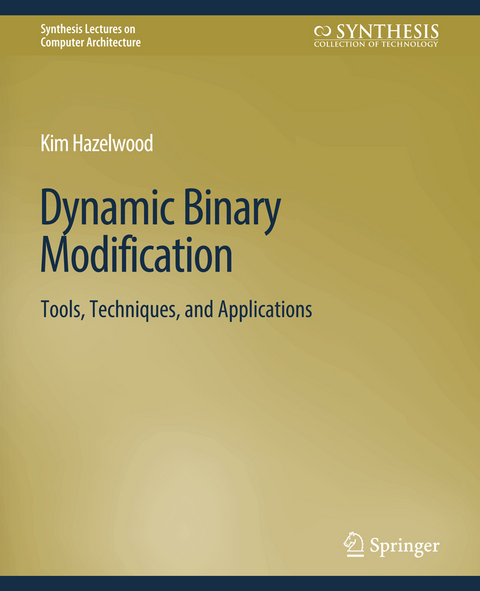
Dynamic Binary Modification
Springer International Publishing (Verlag)
978-3-031-00604-3 (ISBN)
Kim Hazelwood is an Assistant Professor of Computer Science at the University of Virginia and a faculty consultant for Intel Corporation. She works at the boundary between hardware and software,with research efforts focusing on computer architecture, run-time optimizations, and the implementation and applications of process virtualization systems. She received the Ph.D. degree from Harvard University in 2004. Since then, she has become widely known for her active contributions to the Pin dynamic instrumentation system,which allows users to easily inject arbitrary code into existing program binaries at run time (www.pintool.org). Pin is widely used throughout industry and academia to investigate new approaches to program introspection, optimization, security, and architectural design. It has been downloaded over 50,000 times and cited in over 800 publications since it was released in July 2004.Kim has published over 40 peer-reviewed articles related to computer architecture and virtualization.She has served on over two dozen program committees,including ISCA, PLDI, MICRO, OSDI, and PACT, and was a program chair of CGO2010. Kim is the recipient of numerous awards, including the FEST Distinguished Young Investigator Award for Excellence in Science and Technology, an NSF CAREER Award, a Woodrow Wilson Career Enhancement Fellowship, the Anita Borg Early Career Award, an MIT Technology Review "Top 35 Innovators under 35 Award," and research awards from Microsoft, Google, NSF, and the SRC. Her research has been featured in MIT Technology Review, Computer World, ZDNet, EE Times, and Slashdot.
Dynamic Binary Modification: Overview.- Using a Dynamic Binary Modifier.- Program Analysis and Debugging.- Active Program Modification.- Architectural Exploration.- Advanced System Internals.- Historical Perspectives.- Summary and Observations.
| Erscheinungsdatum | 06.06.2022 |
|---|---|
| Reihe/Serie | Synthesis Lectures on Computer Architecture |
| Zusatzinfo | XIII, 67 p. |
| Verlagsort | Cham |
| Sprache | englisch |
| Maße | 191 x 235 mm |
| Gewicht | 178 g |
| Themenwelt | Mathematik / Informatik ► Informatik ► Theorie / Studium |
| Technik ► Elektrotechnik / Energietechnik | |
| ISBN-10 | 3-031-00604-6 / 3031006046 |
| ISBN-13 | 978-3-031-00604-3 / 9783031006043 |
| Zustand | Neuware |
| Haben Sie eine Frage zum Produkt? |
aus dem Bereich


